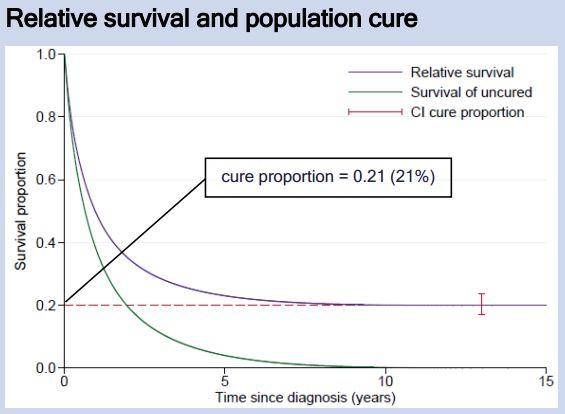Measuring cancer cure in Ireland: latest report from the National Cancer Registry
This report presents, for the first time, national (population-based) estimates of proportions of cancer patients in Ireland cured, for oesophageal, stomach, colon, rectal, pancreatic, liver, lung and ovarian cancer. Within this group of cancers, ranging from those with very poor to those with moderate average survival expectations, estimates ranged from only 5% of pancreatic cancer patients cured to about 40-45% for colon and rectal cancer patients.

A common question that cancer patients have at diagnosis is: “What are my chances of being cured?” While it may not be possible to determine with certainty if and when any individual is cured of cancer, at the population level ‘statistical cure’ is a useful concept in cancer epidemiology. Statistical cure is when a group of cancer patients has the same mortality as cancer-free individuals and is a useful way of monitoring progress in cancer care. The estimated proportion of people with cancer that have been cured by their treatment (cure proportion) in Ireland is reported here for the first time.
Another way to look at this question following a cancer diagnosis is: “How has my life expectancy changed?” Loss of life expectation expressed as ‘years lost’ is easy to understand and can be calculated for different types of cancers for different age groups. Relative survival (expressed as a percentage) is a third way of comparing the survival of people who have cancer with those who don’t, over a certain period of time. The relative survival percentage shows whether the disease shortens life.
In this report we present results for Ireland on cure proportions, loss of life expectation and relative survival from a collaborative international project, the International Cancer Benchmarking Partnership (ICBP) SurvMark-2 study. This study uses data and funding support from cancer registries in seven high-income countries (Australia, Canada, Denmark, Ireland, New Zealand, Norway, and the UK) and aims to establish the most up-to-date international cancer survival standards for a group of cancers of poor to moderate average survival. These include cancers of the oesophagus, stomach, colon, rectum, liver, pancreas, lung, and ovary.
Using data from 2011-2013, the probability of cure among Irish patients was lowest for cancers of the pancreas (5% in both males and females), lung (8% male, 12% female), oesophagus (13% in both males and females), liver (18% male, 8% female), stomach (19% male, 21% female) and ovary (21%). The probability of cure was substantially higher for cancers of the rectum (38% male, 45% female) and colon (43% male, 47% female).
Specific figures are not yet available on how these cure statistics have changed over time within Ireland, but other figures in this report confirm that five-year relative survival for all of these cancers has improved substantially in recent decades – in line with previous NCRI findings.
Rankings, by cancer type, of average cure proportions are quite similar to the average five-year relative survival for the various cancers examined. The five-year relative survival figures for Ireland for the same time period were: pancreas (7% in both males and females); lung (10% male, 16% female); oesophagus (16% male, 19% female); liver (21% male, 10% female); stomach (23% male, 25% female); ovary (31%); rectum (54% male, 59% female); and colon (53% male, 55% female).
Typically, the likelihood of cure is highest for the younger patients, when stage and treatment options may be more favourable, but average loss of years of life is greatest for younger patients, for a given cancer type.
Fuller results of the study (including international comparisons) will be published by the ICBP later in 2019, and it is planned that methods used in the ICBP study will be applied more routinely by NCRI as part on ongoing surveillance of progress in cancer control in Ireland.
Share this page